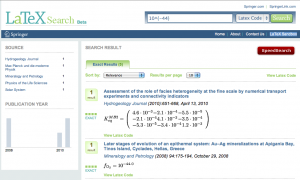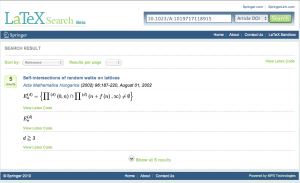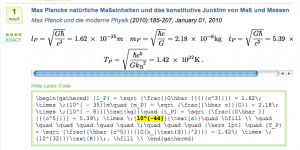I got to talking with a mathematician friend about citation management. We came to the conclusion that “manage PDFs” is my primary goal while “get out good citations” is his primary goal. I thought it would interesting to look at his requirements.
His ideal program would
- Organize the PDFs (Papers does this, when it doesn’t botch the author names and the title) preferably in the file system, so I can use Dropbox
- Get BibTeX entires from MathSciNet, ACM, etc. EXACTLY AS THEY ARE
- Have some decent way to organize notes by “project” or something
He doesn’t care about:
- Typing \cite
- A “unified” bibliographic database
- Social bibliographies (though I am not against them; it is just not a burning issue)
He says:
I guess the point is that, if I am writing something and I know I want to cite it, and I know there is a “official” BibTeX for it, I just need a way to get that more quickly than:
- Type the URL
- Click on “Proxy this” in my bookmarks bar
- Search for the paper
- Copy/paste the BibTeX
- Edit the cite key to something mnemonic
He followed up with an example of the “awful” awful, lossy markup Papers produces which loses information including the ISSN and DOI; he prefers the minimalist BibTeX. (oops!; he adds “I understated how bad papers is. The real papers entry (top) not only has screwy names, but junk instead of the full journal name. The papers cite key is meaningless noise too (but mathscinet is meaningful noise).”) To get around this, he does the same search/download “a million times”.
AMS Papers2 BibTeX:
@article{AR78,
author = {L Asimow and B Roth},
journal = {Trans. Amer. Math. Soc.},
title = {The rigidity of graphs},
pages = {279--289},
volume = {245},
year = {1978},
}
Papers' The AMS version of the same BibTeX:
@article {AR78,
AUTHOR = {Asimow, L. and Roth, B.},
TITLE = {The rigidity of graphs},
JOURNAL = {Trans. Amer. Math. Soc.},
FJOURNAL = {Transactions of the American Mathematical Society},
VOLUME = {245},
YEAR = {1978},
PAGES = {279--289},
ISSN = {0002-9947},
CODEN = {TAMTAM},
MRCLASS = {57M15 (05C10 52A40 53B50 73K05)},
MRNUMBER = {511410 (80i:57004a)},
MRREVIEWER = {G. Laman},
DOI = {10.2307/1998867},
URL = {http://dx.doi.org/10.2307/1998867},
}
I’ve just discovered that BibDesk‘s ((See also A short review of BibDesk from MacResearch)) ‘minimize’ does what he wants: its has output is quite close to the AMS Papers2 version:
@article{AR78,
Author = {Asimow, L. and Roth, B.},
Journal = {Trans. Amer. Math. Soc.},
Pages = {279--289},
Title = {The rigidity of graphs},
Volume = {245},
Year = {1978}}
I’d still like to understand the impact the non-minimal BibTeX is having; could be bad citation styles are causing part of the problem.
While we have different needs for citation management, we’re both annoyed by the default filenames many publishers use – like fulltext.pdf and sdarticle.pdf. But I’ll tolerate these, as long as I can get to it from a database index with a nice frontend.
We of course moved on to discussing how research needs an iTunes or, as Geoff Bilder has called it, an iPapers.
This blog post brought to you by Google chat and the number 3.


